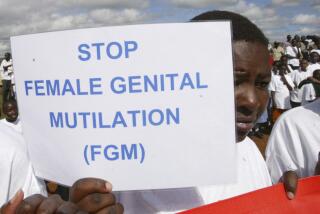ABORTION : S. Africa to Vastly Liberalize Law : ANC ready to dump tough restrictions that critics say hurt the poor.
- Share via
JOHANNESBURG, South Africa — Pope John Paul II may find a discordant note in the welcoming fanfare when he arrives here today on his first pastoral visit.
For while the Pope is expected during his three-day visit to preach a message praising the sanctity of life, the newly democratic government here appears committed to passing one of the world’s most liberal abortion laws.
Current South African law has effectively restricted legal abortions to about 1,000 women a year. But researchers estimate that more than 44,000 women are hospitalized each year, and at least 425 die, because of complications from illegal and unsafe abortions. The total number of illegal abortions is believed far higher.
Partly as a result, the National Assembly voted on Aug. 30 to approve a committee report that recommended legalizing abortion on request for any woman in the first 14 weeks of pregnancy and with a doctor’s approval in the first 24 weeks.
The committee recommended that counseling for women be made available but not mandatory except for minors. No waiting period, nor spousal approval, would be required. And while health workers would not be forced to participate, they would have to refer patients requesting abortions.
That makes the proposed rules less restrictive than those in the United States, Britain, Germany or France, officials here say. “The legislation being drafted is basically pro-choice,” said Samuel Mphuthi, executive director of the Planned Parenthood Assn. of South Africa. “We’re quite happy.”
Strong support for legalized abortion from the African National Congress, the dominant government party, means the proposal is almost certain to pass when Parliament resumes early next year.
That won’t end an increasingly emotional debate under way here. While hardly as impassioned or as organized as in the United States, pro-choice and anti-abortion forces are girding for court challenges, and perhaps more, in coming months.
“We’ll do whatever we can to fight this law as long as it’s not illegal,” said Dr. Claude Newbury, head of Prolife, which has 8,000 members and is the largest and oldest of the anti-abortion forces. “No, we’ll take every action short of anything immoral. Any government that allows the killing of children makes itself an illegal regime.”
Newbury, who opposes abortion even in cases of rape or incest, described the proposed legalization as “the most evil law” in South Africa’s history, and “much, much worse than apartheid.”
The current law, passed in 1975, permits abortions only in cases of rape or incest, if a continued pregnancy endangers the life of the mother or child, or other narrowly prescribed circumstances. It requires women to get permission from as many as four doctors, and, if raped, to be certified by a magistrate and district surgeon.
The effect has been to limit most legal abortions to white women able to negotiate those hurdles--and to prompt a vast network of illegal abortion mills.
Extrapolating data from hospitals across the country, the government’s Medical Research Council estimated last month that 44,700 women--most of them black--are admitted to hospitals each year with incomplete or botched abortions.
“We suspect this is an underestimate of the total number of women who have abortions,” the report said. “Not all women attend hospitals; some stay home; some seek care from private gynecologists, general practitioners or clinics; others die without ever attending hospital.”
Marj Dyer, head of the Abortion Rights Action Group, estimates at least 250,000 “back-street abortions” are performed each year. Doctors say some involve strong antiseptic mixtures, which can cause kidney failure, or herbal remedies that poison the body.
In an interview, a 38-year-old single mother of four described her abortion, which took place on the floor of a dingy Soweto home earlier this year. Since it was illegal, she asked not to be identified.
“I was about nine weeks,” she said. “She told me to lie down and she put a long, thin instrument into me again and again. I nearly fainted from the pain. I could not walk afterward.”
When her pain and bleeding continued for several days, the woman was hospitalized. After operating, doctors said her uterus was infected and she would no longer be able to have children.
“I know I could have died the way I did it, and I was very ill--I lost a lot of blood and I suffered terrible pain and fever,” the woman said. “But a woman who cannot have another baby will find a way to have an abortion. She will find a way. . . . I hope that the government changes the law so things are made safer for women.”
More to Read
Sign up for Essential California
The most important California stories and recommendations in your inbox every morning.
You may occasionally receive promotional content from the Los Angeles Times.














